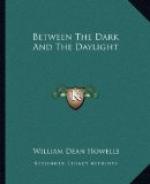“We got a little acquainted with the people, after awhile, and I heard some stories of the country folks that I thought were pretty good. One was about an old German farmer on whose land a prospecting metallurgist found zinc ore; the scientific man brought him the bright yellow button by which the zinc proved its existence in its union with copper, and the old fellow asked in an awestricken whisper: ‘Is it a gold-mine?’ ’No, no. Guess again.’ ‘Then it’s a brass-mine!’ But before they began to find zinc there in the lovely Lehigh Valley—you can stand by an open zinc-mine and look down into it where the rock and earth are left standing, and you seem to be looking down into a range of sharp mountain peaks and pinnacles—it was the richest farming region in the whole fat State of Pennsylvania; and there was a young farmer who owned a vast tract of it, and who went to fetch home a young wife from Philadelphia way, somewhere. He drove there and back in his own buggy, and when he reached the top overlooking the valley, with his bride, he stopped his horse, and pointed with his whip. ‘There,’ he said, ’as far as the sky is blue, it’s all ours!’ I thought that was fine.”
“Fine?” I couldn’t help bursting out; “it’s a stroke of poetry.”
Minver cut in: “The thrifty Acton making a note of it for future use in literature.”
“Eh!” Newton queried. “Oh! I don’t mind. You’re welcome to it, Mr. Acton. It’s a pity somebody shouldn’t use it, and of course I can’t.”
“Acton will send you a copy with the usual forty-per-cent. discount and ten off for cash,” the painter said.
They had their little laugh at my expense, and then Newton took up his tale again. “Well, as I was saying—By the way, what was I saying?”
The story-loving Rulledge remembered. “You went out with your wife and children for Easter eggs.”
“Oh yes. Thank you. Well, of course, in a town geographically American, the shops were all shut on Sunday, and we couldn’t buy even an Easter egg on Easter Sunday. But one of the stores had the shade of its show-window up, and the children simply glued themselves to it in such a fascination that we could hardly unstick them. That window was full of all kinds of Easter things—I don’t remember what all; but there were Easter eggs in every imaginable color and pattern, and besides these there were whole troops of toy rabbits. I had forgotten that the natural offspring of Easter eggs is rabbits; but I took a brace, and remembered the fact and announced it to the children. They immediately demanded an explanation, with all sorts of scientific particulars, which I gave them, as reckless of the truth as I thought my wife would suffer without contradicting me. I had to say that while Easter eggs mostly hatched rabbits, there were instances in which they hatched other things, as, for instance, handfuls of eagles and half-eagles and double-eagles, especially in the case of the golden eggs that the




